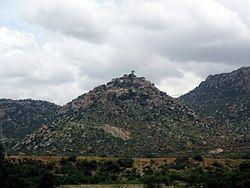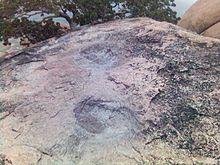Saint Nathar Shah | |
|---|---|
 A small hill where Nathar Shah is said to have lived for years in a cave | |
| Mystic | |
| Born | 969 CE Asia Minor |
| Died | 1038 CE Tiruchirapalli, India |
| Venerated in | By all those Sunni Muslims who venerate saints, especially by those in the Indian subcontinent; some Shia Muslims come to his shrine too |
Nathar Shah (969–1039),[1] also called Nadir Shah or Nathar Wali, was a Muslim mystic and preacher from the Middle East who migrated to Tamil Nadu in the 11th-century, where he travelled from area to area to preach the faith of Islam to the locals.[2] He came to Trichy in the 11th century; his shrine is located in Tiruchirapalli, Tamil Nadu,[3][4] which according to legend is atop the grave of the three-headed Hindu demon Tiriasuran whom Natha killed.[3]
Life in Tiruchirapalli
Nathar Vali's origin is unclear, though various legends describe him as a Byzantine nobleman, who left his comfortable life in search of murshid (spiritual preceptor).[3][5]He was a qalandar (unmarried saint) came to India along with 900 qalandars to spread Islam. During this time, he is said to have performed miracles. Along with his qalandars, he came to Tiruchirapuram, which is now known as Tiruchirappalli, and led a religious life with his qalandars in a flower garden there.
Death
He died in Tiruchirappalli in 1039 and was buried in the city and a mosque constructed at the spot.Long after his death, Tiruchirappalli is still referred to by his followers as "Natharnagar". Nathar Vali died on the 15th of the month of Ramadan. This date is commemorated as his urs (death-day), and the first 17 days of Ramadan are celebrated in his honor, by Muslims, Christians, and Hindus, one the eve of the Kanduri festival, where they seek his blessings.
Alternate names
Nathar Vali's name and title is variously rendered as Nathar Wali, Natharuddin, Baba-e-Nathar Sarmast Tabl-e-Aalam Dhool Samandar and Syed Sha Mutaheruddin Suhrawardy.
References
- ^ Arnold, T. W. (1896). The Preaching of Islam. Charles Scribner and Sons. p. 267.
- ^ Shafique Ali Khan (1985). Two Nation Theory: As a Concept, Strategy and Ideology. Royal Book Company. p. 70. Retrieved 15 September 2013. - Nathar Wali (died in 1039) is supposed to be the earliest Muslim Sufi who dedicated his life to Islam in the south.
- ^ a b c Susan Bayly (22 April 2004). Saints, Goddesses and Kings: Muslims and Christians in South Indian Society, 1700–1900. Cambridge University Press. pp. 137–. ISBN 978-0-521-89103-5. Retrieved 4 May 2011.
- ^ Numismatic Society of India (1962). The journal of the Numismatic Society of India. Numismatic Society of India, P.O. Hindu University. Retrieved 4 May 2011.
- ^ Susan Bayly (22 April 2004). Saints, Goddesses and Kings: Muslims and Christians in South Indian Society, 1700–1900. Cambridge University Press. pp. 117–. ISBN 978-0-521-89103-5. Retrieved 15 September 2013.
